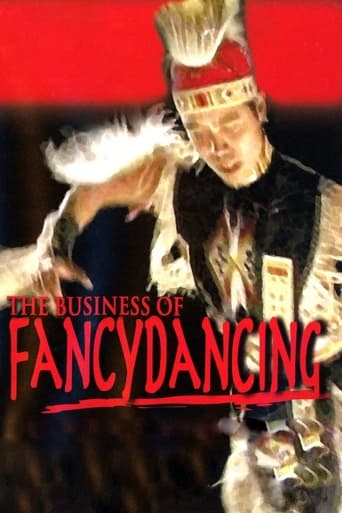

I really like Sherman Alexie. He is a great writer. That said, he is still a writer, and that does not mean he is a good director. The other successful film he was tied to was written by him, but directed by someone else. It shows in this film.The movie has a great idea behind it, but in the end it is just people talking. A lot of talking. Endless talking. Scenes go on and on and on and on... How people feel. Why they did this, why they did that. At times it is hard to watch, especially considering the low production value. It really does not look that great.Film is a visual medium, not a talking medium. People always try to counteract that by saying that films are full of dialogue, and they are. A good film, though. is still made up of actions and visuals, things that we can watch. This does not do that. It just shows people talking all the time. That's it.I really wish this one was handed off to another director who could have made the film into something more visual like "Smoke Signals." Instead we have this, and in the end it just does not hold up that well.
... View MoreWhile we as a country are discovering/acknowledging the struggles of the different sects within the Middle East, tribal differences that are longstanding and divisive and painful, along comes another sensitive story about Native Americans in this country and how the scars of past and ongoing abuses of our 'reservation resolution' have affected the original peoples of this land. Sherman Alexie, a fine poet and novelist, has transformed his written works into a film that showers the viewer with insights into a problem about which few are cognizant - intratribal differences that provide schisms within the only root that binds.Seymour Poltakin (the very talented Evan Adams) is a famous poet who happens to be both Native American and gay. He is called back to his Reservation in Spokane, Washington for the funeral of his childhood friend Mouse (Swil Kanim) only to confront all of the reasons he has left the Reservation for the 'white man's world' where he has found both financial and emotional success. Seymour's best friend Aristotle (Gene Tagaban) had originally left the Reservation to go to college with Seymour, but quickly soured to the prejudiced outside world and returned to his Reservation and to an unfortunate life of alcoholism and drug abuse. The bulk of the storyline revolves around how these two once devoted friends parted ways, the philosophies of each are explored, and though Seymour finds moments of love in his home space, he is still content to return to his white man lover and his life he has chosen.There are many very tender and moving moments in this film: when Seymour is in conversation with Agnes (Michelle St. John) and when Agnes intones the Indian chants and songs at the funeral; Seymour's dialogues with his lover; scenes of quiet while Aristotle abuses himself with drugs; the weaving in and out of the beautiful dancing that flows through the film. The problem with the movie is the disparity of approaches in telling the story: an interview situation between Rebecca Carroll and Evan Adams is well written but breaks the mood of the poetic form of the story. The film is obviously low budget and in this case, for this viewer, the rough hand-held camera technique adds a quality of reality to what we are watching.The overall effect at the end of the film is a pang of pain in the heart having witnessed the generations of 'isolation' and the segregation of the Native Americans into spaces both geographical and sociological that have undermined a tremendously valuable asset to our history. That role of shame is one that will never leave us, and it is a gift that artists like Sherman Alexie can bring this to the public's attention. Recommended. Grady Harp
... View MoreAlexie Sherman, author of Smoke Signals, directs his first film with a lot of help from his friends. Sherman cuts through the normal hierachical structure of film sets to allow the director of photography, script supervisor, and actors unprecedented freedom in improvization with the camera. One can only hope this is the beginning of a good thing.The storyline is non-linear and, perhaps, hard to follow for those used to Hollywood films, but the result is perhaps the best example of how the cinema can be used for pure poetry without the need for standard conflict resolution storytelling.
... View MoreThis was my favorite of the 8 films I saw at the Florida Film Festival. It is a visually stunning film with strong emotional content. Poetic interludes punctuate the story and lend to the reality of the lead character (a poet). Behind it all, is an honesty and a truth that you do not find in the majority of films.
... View More